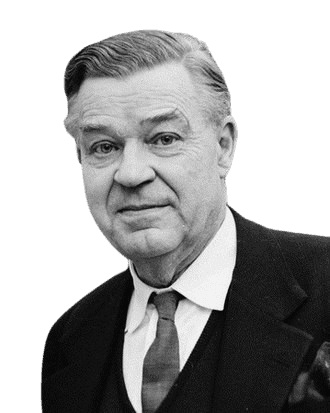Life and achievements
Early life
Gunnar Myrdal was born in 1898 and was brought up in the rural community of Dalarna in central Sweden. His desire for knowledge took him to Stockholm University, where he pursued law and then economics under the tutelage of Gustav Cassel, an eminent economist.
Myrdal started his career as a monetary theorist, and his doctoral thesis analyzed the price formation process under economic change conditions. Inspired by John Maynard Keynes, Myrdal joined the Stockholm School of Economics, which elaborated such concepts as macroeconomic planning and the government’s ability to balance the economy.
The following year, 1924, Myrdal married Alva Reimer, a fellow scholar and social reformer. Together, they would become the I.T. couple in Swedish academia and politics. In the 1930s, Myrdal transitioned from theoretical economics to practical social science and wrote The Political Element in the Development of Economic Theory, which asserted that economic theories are politicized. His criticism of conventional economics models was crucial for his future work on inequality, as he opined that economics ought to be more socially productive.
He started developing an understanding that economics could be used to solve poverty and inequality issues, which later characterized his work.
Legacy
Gunnar Myrdal has made contributions not only in the field of economics but also in sociology and political science. His work revolutionized how students and policymakers view race, poverty, and the state’s responsibility towards society. His concept of cumulative causation has been incorporated into the modern theories of economic inequality and is a significant concept in development economics.
He made substantial contributions to the theory of the equilibrium of money and money’s value and the distinction between the ex-ante and ex-post point of view for expectations that have formed the structure of macroeconomic thought in the contemporary world. Myrdal’s passion for social justice and his opposition to the free-market economy remain inspiring to the theoreticians and practitioners promoting state interference to level socioeconomic differences.
For example, Myrdal’s An American Dilemma not only played the role of the precursor to the Civil Rights Movement but also paved the way for the contemporary analysis of race relations and race prejudice in the United States. His warning about the economic divergence between rich and poor nations, articulated in Asian Drama: The Poverty of Nations, is still actual today when nations still face the problems of inequality.
On the need to pursue the idea of a ‘welfare world,’ Myrdal takes it beyond national borders, suggesting that economic justice is a global issue. Nevertheless, Myrdal, who received the Nobel Prize and had an enormous impact, was frequently discussed. He questioned many of the established beliefs in economy and politics in the period, arguing that both the capitalist and the communist systems lacked adequate solutions for the issue of inequity.
He went to the extent of claiming that economics is not only politics, but politics is economics, and economics is values. This perspective was considered heresy in the past but is still considered a subject of discussion among economists in the present. He remained married to Alva Myrdal, with whom he had children, and she was a Nobel Peace Prize winner who worked for world peace and equality.
Milestone moments
Jul 19, 1903
Publication of The Political Element in the Development of Economic Theory
In 1930, Myrdal Gunnar published his book The Political Element in the Development of Economic Theory, in which he disputed the idea of economics as an impartial discipline.
In this work, Myrdal pointed out that political ideologies always influence economic theories and encouraged researchers to be more open about such biases.
This publication placed Myrdal on the map of economic theory and laid the foundation for his lifelong project of critiquing the relationship between economics and politics.
Apr 17, 1944
An American Dilemma published
In 1944, Myrdal published An American Dilemma: The Negro Problem and Modern Democracy, which has become a significant source of information on race relations in the USA.
The book gave a clear account of how blacks had been discriminated against and how this discriminated against them against the democracy of America; this played a role in the Supreme Court in Brown v. Board of Education.
This achievement placed Myrdal on the global map of social science scholars. It made his work a reference point in formulating civil rights in the United States of America.
Oct 10, 1947
Elected as the Executive Secretary of the United Nations Economic Commission for Europe
After the Second World War, he was appointed as the Executive Secretary of the United Nations Economic Commission for Europe in 1947. There, he was responsible for post-war reconstruction and the development of economic policies.
While in this position, he shaped the policy of Europe, the reconstruction of economies devastated by war, and the cooperation of nations.
Through this role, Myrdal continued to prove his passion for international economic equity and expanded his input on global policy.
Oct 19, 1968
Publication of Asian Drama: The Poverty of Nations: An Inquiry into the History of Poverty, Nature of Poverty, and Relevant Policies and Practices
In 1968, Myrdal published a three-volume work titled Asian Drama on poverty and development in South Asia. It exposed the flaws in the dominant economic paradigm of development.
Myrdal pointed out that population growth, social relations, and policies in Asia would slow economic development, and poverty can only be tackled through systemic change.
This work established Myrdal in the more prominent fraternity of development economics and created worldwide discourses on poverty, development, and planning.
